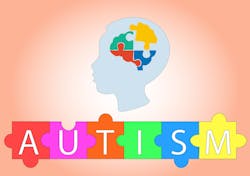Researchers at the University of Washington report on a new set of ultra-rare gene variants that increase a child’s risk of developing autism.
“These ultra-rare variants involve a set of genes that have not been associated with autism before,” said Amy B. Wilfert, Senior Research Fellow in the Department of Genome Sciences at the University of Washington School of Medicine. She was the lead author of the report published in the journal Nature Genetics. Evan Eichler, UW professor of genome sciences, led the team that conducted the study.
Autism, or autism spectrum disorder (ASD), affects about 1 in 59 children in the United States. The exact cause is unknown, but certain genes with deleterious mutation are known to increase the risk of developing the disorder.
To date, most research has focused on genes with mutations not found in the parents’ genomes but which originate in the sperm, the egg, or very early in the development of the fertilized egg. Such “de novo” variants have been shown to greatly increase a child’s risk of developing ASD, but account for a relatively small percentage of cases.
To better understand how children might inherit mutations in genes from a parent that put them at risk of developing ASD, the Seattle researchers and their collaborators looked for variants in genes so rare that they appeared in only one parent in a study group involving thousands of families. Such variants are called ultra-rare or private variants.
To find these ultra-rare variants, the researchers examined the genome sequences of nearly 3,500 families that had at least one child with ASD. They limited their search to changes in the genes that would likely disable the gene, called likely-gene disruptive (LGD) variants. They then repeated the analysis in a larger dataset of nearly 6,000 families. Overall, they analyzed nearly 35,000 genomes.
In the end, they identified 163 candidate genes with private LGD variants that collectively increase the risk of ASD. These genes had not been previously identified as ASD-risk genes by studies of de novo variants. The researchers estimate these mutations in these genes may account for as much as 4.5% of autism cases. That’s on par with the percentage ascribed to the more intensely studied de novo variants.
Inheriting one or more of these variants is not enough to cause ASD as none of the parents who carried the variants had ASD, the researchers found. Some additional factors, either genetic or environmental, must, therefore, have to be present for the child to go on to develop ASD. This finding supports the theory that changes in multiple genes must be present for a child to develop ASD, known as the “multi-hit” model. “Our study suggests that one inherited mutation is not enough,” said Wilfert. “You need at least one other mutation to push a child over the threshold required to be diagnosed with autism.”
One reason why these variants are so rare is that they appear to be relatively short-lived, persisting in a family for only a few generations, perhaps because those children that inherit them are less likely to go on to have children of their own, the researchers said.

